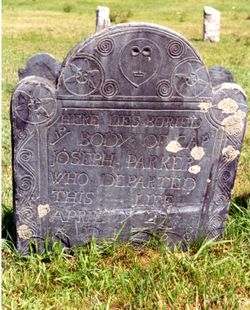Moses Parker, “the most prominent military character”
In 1738, when Moses was seven years old, Joseph Parker died. According to a Parker family genealogy he “perished, with his whole command, in a terrible battle with the Oneidas.” However, I can’t find any other mention of such an event. And his body was buried in Chelmsford, not a frontier battlefield. Joseph Parker’s gravestone appears here, courtesy of Find a Grave.
As an adult, Moses Parker followed his father into the provincial military service. A Chelmsford company set out for northern New York in March 1755 and stayed until January. Moses Parker went out as a sergeant and evidently came back as an ensign.
Wilkes Allen’s 1820 History of Chelmsford then says of Parker:
In 1758, he was honored with a lieutenant’s commission in a company commanded by Capt. Jona. Butterfield, and raised for the express purpose of a general invasion of Canada. He was promoted to a captain in the succeeding year, and in 1760, commanded a company at Fort Frederick, St. John’s. In this expedition he distinguished himself as a brave soldier, and as an intrepid and dauntless officer, he was endeared to those under his care by his assidiuous [sic] attention to their wants and constant endeavors to render their situation as pleasant as circumstances would permit.According to the Rev. Wilson Waters’s 1917 history of Chelmsford, Parker’s farm was 150 rods south of where “the Middlesex turnpike [now Turnpike Road]…crosses River Meadow brook.”
Such was his reputation that when Governour [Francis] Bernard in 1761, was selecting from a multitude of applicants, thirty captains for that year’s service, Capt. Parker stood forth the most prominent military character on the list. Col. [Nathaniel] Thwing [1703-1768] and Col. [William] Arbuthnot [1726-1765] declared, that “they would not go without him, that he was the only Captain they had insisted upon.” So great was his popularity, that his friends assured him, that if he would accept of a captainship, “fifty men might be immediately raised to serve under him.” [Footnote citation: “M.S. Letter of Oliver Fletcher, Esq.”]
In May 1774, Moses Parker was named as one of Chelmsford’s committee of correspondence. In April 1775, he commanded a company that responded to the Lexington Alarm. And on 19 May 1775 he accepted a commission from the Massachusetts Provincial Congress, with Dr. Joseph Warren presiding and signing the paperwork, as a lieutenant colonel.
Parker was in the regiment of Col. Ebenezer Bridge, a thirty-one-year-old Harvard graduate and son of Chelmsford’s minister. The major was twenty-three-year-old Dr. John Brooks of Reading. At age forty-four, with four military campaigns under his belt, Lt. Col. Parker was the regiment’s veteran officer.
On the night of 16 June 1775, Col. Bridge’s regiment was ordered to march onto the Charlestown peninsula under Col. William Prescott and fortify Bunker’s Hill.
TOMORROW: In the redoubt.

